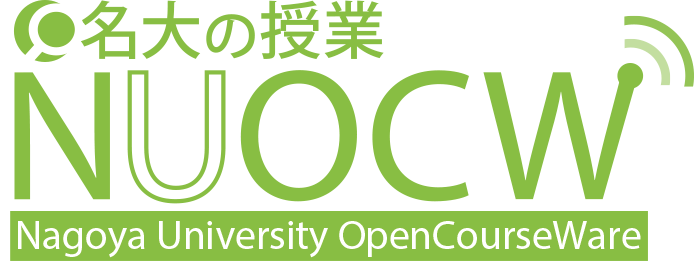Overseas Practical Training
| Lecturer | Kei-ichiro MAEDA, Professor |
|---|---|
| Department | School of Agricultural Sciences / Graduate School of Bioagricultural Sciences, 2011 Intensive Lecture |
| Recommended for: | School of Agriculture 3rd and 4th year students (2・Intensive Course) |
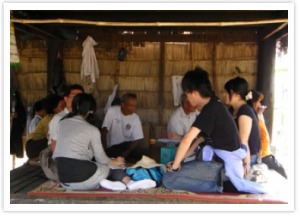
Key Features
Here I have published a selection of slides by the groups from the final presentation evening.
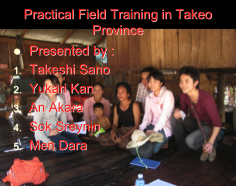
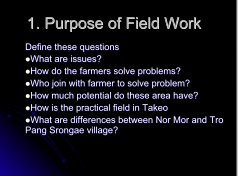
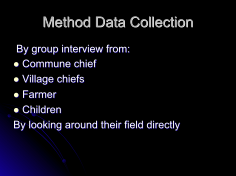
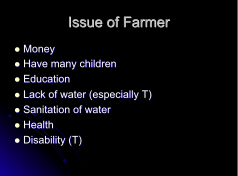
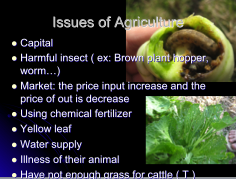
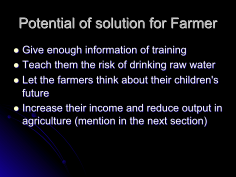
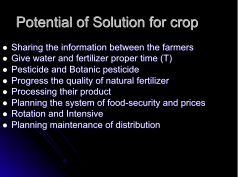
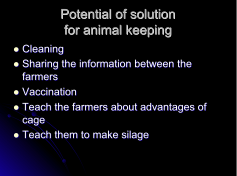
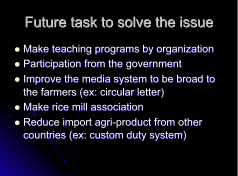
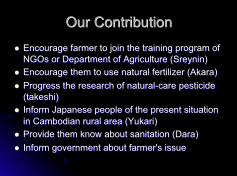
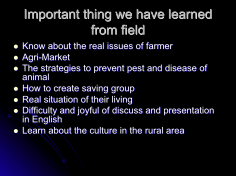
Course Aims
From the basis of knowledge/experience learnt by the 3rd year of natural and social sciences as well as domestic practices in agricultural regions, we will directly inspect countries' agricultures which have different natural, cultural or social backgrounds and analyze potential problems.
Contents
We will conduct an investigation of the agricultural regions of Takeo Province, Cambodia. Forming groups with the Royal University of Agriculture's 3rd year students, we will inspect agricultural areas, hold interviews with the farmers, analyze the data, and then as a result on the last day we will conduct presentations. The program is about one week, and all communication with the Cambodians will be done in English. There are around 10 places available, and depending on student numbers a similar number of Cambodian students will also participate. There will be five Japanese academic staff and 5 Cambodian academic staff to help with our activities in Cambodia. Before leaving Japan we will hold around 4 training sessions, to give students a basic idea of historical, social, cultural and agricultural Cambodian industries. Also after returning we will hold a recap session for the course. Details concerning dates and necessary finances will be posted at a nearer time.
Textbooks
None
Reference Books
These will be recommended during the initial training sessions
Reference Materials
About the Royal University of Agriculture
The RUA is one of 9 Royal Universities in Cambodia, situated in the suburbs of the capital city Phnom Penh. It was founded in 1964, but was seriously affected under the rule of Pol Pot from 1975-1978 following the mass execution of intellectuals and destruction of the university. Later, under the cooperation with Nagoya University and the JICA, a training program was reinitiated, and in 2002 a master's course was established followed by a doctorate course in 2006. Currently, the university is organized into the following 8 departments. There were 1,531 students attending the university in 2006.
- Faculty of Agronomy Sciences
- Faculty of Animal Science and Verterinary Medicine
- Faculty of Forestry
- Faculty of Fisheries
- Faculty of Agricultural Technology and Management
- Faculty of Agricultural Economics and Rural Development
- Faculty of Agro-Industry
- Faculty of Land Management and Land Administration
Note: All files are in Japanese.
Nagoya University Topics No.190p.21
Assignments
Students will visit and investigate two agricultural communities with contrasting agricultural capabilities and subsequently different standards of living, then should, using all their knowledge gained from lectures and practical experiences, consider why this difference exists.
1. Advance Training Sessions
All students involved got together, and learn basic knowledge about Cambodia, and specifics about the training, important notes and training contents were also explained.
| Session | Contents |
|---|---|
| 1 | Cambodian Society, Culture and History |
| 2 | Outline of Cambodian Agriculture Things you should know about Cambodia |
| 3 | Explanation of the tasks concerning on-site inspections |
| 4 | Confirming the training contents, and official procedures |
2. Practical Training
From 2009 January 19th – 25th.
Location: Cambodia, Phnom Penh and Takeo Provinces
| Session | Contents |
|---|---|
| 1 | Depart Nagoya, arrive Phnom Penh. |
| 2 | Training Initiation (at the Royal University of Agriculture) Opening seminar Group discussions: introductions, discuss on-site investigations |
| 3 | Visiting a pepper farm (Phnom Penh) Investigating agricultural produce in supermarkets and central markets Move by minibus to an agricultural community Takeo Province |
| 4 | An explanation of the village by the village chief Interviews and investigation in the village farms |
| 5 | Interviews and investigation in the village farms Inspection of a shochu production plant Move by minibus to Phnom Penh Group presentation preparation |
| 6 | Group presentation evening (at the RUA) Closure of the training, award of the course-completion certificates Depart Phnom Penh |
| 7 | Arrive Nagoya End |
| 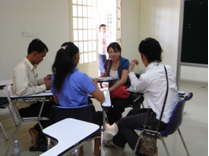 | 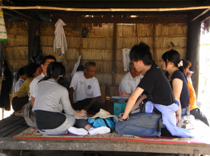 |
| Talking about items of investigation | Interviewing the farmers |
| 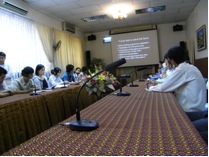 | 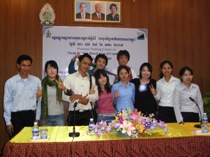 |
| Group presentations | Commemorative group photo after presentation |
3. Post-training
Held on 2009 March 5th.
Students gave presentations about their thoughts on the training, reflections, and proposals for the following year's training.
Grading
1 credit will be evaluated depending on attendance at the advance training sessions, the practical training, and the post-training, as well as content and performance during the presentations.
Last updated
March 12, 2020
